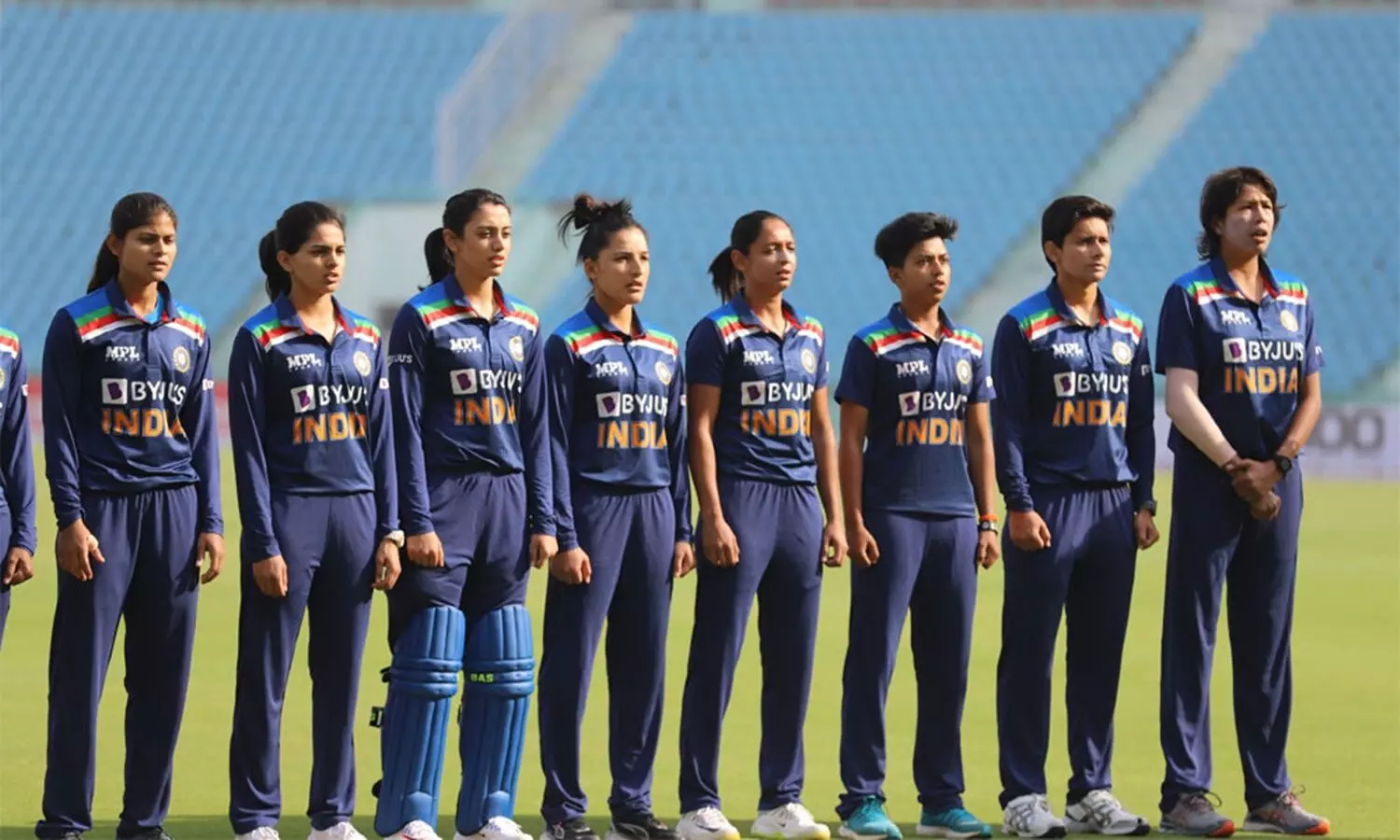Women's Cricket
Salaries of Indian cricketers: Differences between men's and women's teams
Smriti Mandhana, one of the highest earning members of the current women's team, is contracted to BCCI with as much money as the highest paid players in the 2004 Indian men's team were. She gets half the amount that a player from the lowest grade in the men's team gets now.

The Indian women's cricket team line up for the national anthem (File Photo/BCCI)
Indian women's cricket has come a long way since the 1970s and 80s when national team players had to finance their own trips and share their train berths and cricket kits. The women's game, which has developed independently of the men's game in India, has taken rapid strides in recent years in terms of financial stability, but there still remains a huge chasm.
Smriti Mandhana, one of the highest earning members of the current women's team, is contracted to the BCCI with as much money as the highest paid players in the 2004 Indian men's team like Sachin Tendulkar and Sourav Ganguly were - Rs 50 lakh.
READ | Smriti Mandhana, Jemimah Rodrigues retained by The Hundred teams in top pay bracket
But the total earnings of cricketers for playing for their country is not through these central contracts alone. The total payout an Indian player gets is a combination of his contract money, match fees, prize money and a percentage of the BCCI's gross annual revenue.
The BCCI pays 26% of its revenue every year to its players; men's international players get 13% of this, domestic players 10.3% and 2.7% goes to junior players and women.
We try to break down the three other elements of the salaries received by an Indian men's cricketer and women's cricketer and find out the differences.
Central contracts
The base salary of contracted cricketers, the BCCI's central contracts have risen exponentially in recent years, both in the men's game and the women's game.
Central contracts for 2021-22
Women's Contracts 2021/22: Category A (Rs 50 lakh), Category B (Rs 30 lakh) and Category C (Rs 10 lakh).
Men's Contracts 2021/22: Category A+ (Rs 7 crore), Category A (Rs 5 crore), Category B (Rs 3 crore) and Category C (Rs 1 crore).
Central contracts for 2015-16
Men's Contracts 2015/16: Grade A (Rs 1 crore), Grade B (Rs 50 lakhs), Grade C (Rs 25 lakhs)
Women's Contracts 2015/16: Category A (Rs 15 lakh), Category B (Rs 10 lakh)
Even the players from the lowest-ranked category for men cricketers like Washington Sundar and Wriddhiman Saha are paid Rs 50 lakh more (double the money) than the highest paid women cricketers as part of the central contracts like Mandhana, as of 2021/22.
Women's Categories (2021/22)
A - Harmanpreet Kaur, Smriti Mandhana, Poonam Yadav, Deepti Sharma, Rajeshwari Gayakwad
B - Mithali Raj, Jhulan Goswami, Tanya Bhatia, Shafali Verma, Pooja Vastrakar
C - Poonam Raut, Shikha Pandey, Jemimah Rodrigues, Richa Ghosh, Harleen Deol, Arundhati Reddy, Sneh Rana
Men's Categories (2021/22)
A+: Rohit Sharma, Virat Kohli and Jasprit Bumrah
A: Ravindra Jadeja, Ravichandran Ashwin, Rishabh Pant, KL Rahul and Mohammed Shami.
B: Cheteshwar Pujara, Ajinkya Rahane, Axar Patel, Shardul Thakur, Shreyas Iyer, Mohammed Siraj, Ishant Sharma.
C: Suryakumar Yadav, Umesh Yadav, Bhuvneshwar Kumar, Hanuma Vihari, Hardik Pandya, Washington Sundar, Deepak Chahar, Shubman Gill, Shikhar Dhawan, Yuzvendra Chahal, Wriddhiman Saha, Mayank Agarwal.
Prize Money
After the 2020 Women's T20 World Cup, where India reached the final, the women's team received prize money of Rs 3.75 crore.
After the 2021 Men's T20 World Cup, where India exited in the group stage, the men's team got Rs 41.63 crore.
Match fees
Match fees are usually variable because it depends of number of sponsors for the event and other factors. The number of sponsors in men's cricket events are usually much more than in the women's game.
According to rough estimates, an Indian male cricketer gets match fees of Rs 15 lakh to play a Test Match, Rs 6 lakh to play an ODI, Rs. 3 lakhs to play a T20I, according to a survey by Cricket Monthly in 2017.
On average, a senior woman cricketer is paid around Rs 20,000 per day — equivalent to the wage of an Under-19 male cricketer. For comparison, senior male cricketers make Rs 60,000 per match per day.
Equal Pay - For (Cricket Australia) and against (Smriti Mandhana)
"We need to understand that the revenue which we get is through men's cricket. The day women's cricket starts getting revenue, I will be the first person to say that we need the same thing. But right now, we can't say that," Smriti Mandhana had told reporters at a promotional event in 2020.
"I don't think any of the teammates are thinking about this gap because the only focus right now is to win matches for India, get the crowd coming in, get the revenue. That is the thing which we are aiming for and if that happens, all other things are going to fall in place," she said.
The Australian cricket board vowed equal pay for the women's team after the 2020 T20 World Cup, and paid 600,000 USD to the women's team after they won the final to make up for the difference in ICC's prize money.
"We want to continue our commitment to equality by ensuring that any prize money earned by the Australian women's team in the T20 World Cup is the same as what is on offer in the men's side of the tournament. This will include matching the prize money for the final, semi-finals, or group stage," said Kevin Roberts, CA CEO in 2019.
